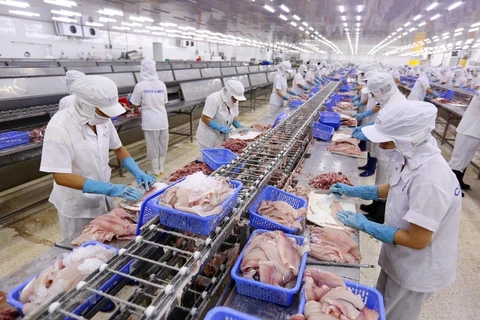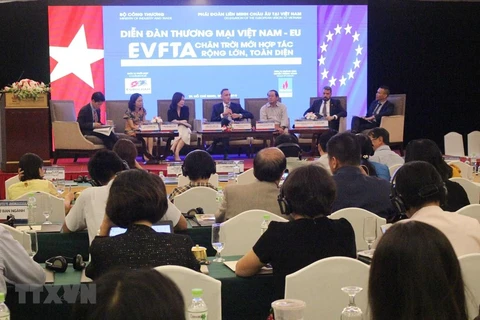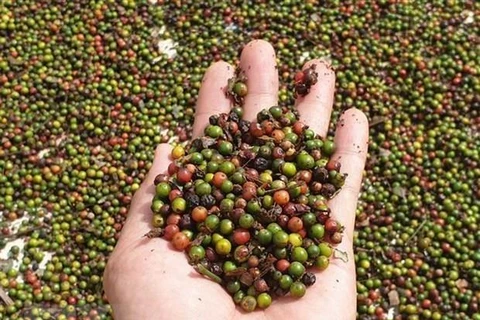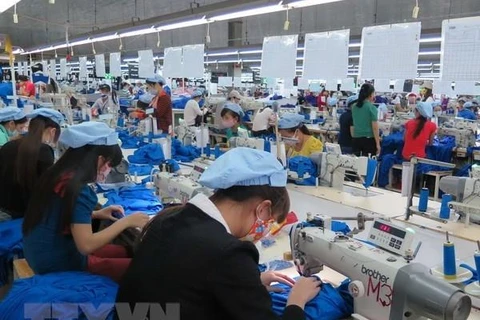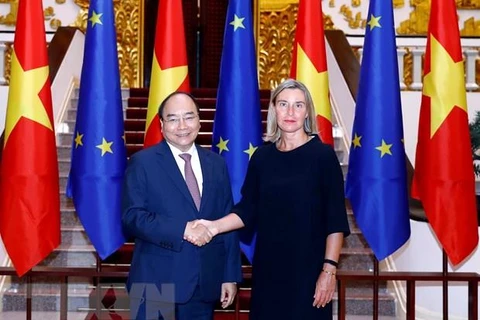 Deputy chairman of EuroCham in Vietnam Jean Jacques Bouflet speaks at the seminar in Ho Chi Minh City on April 14 (Photo: VNA)
Deputy chairman of EuroCham in Vietnam Jean Jacques Bouflet speaks at the seminar in Ho Chi Minh City on April 14 (Photo: VNA) HCM City (VNS/VNA) - The EU-Vietnam Free Trade Agreement would provide a big impetus to Vietnam's exports to the EU and be key to Vietnamese companies penetrating one of the largest and most lucrative markets in the world, experts have said.
Jean Jacques Bouflet, deputy chairman of EuroCham in Vietnam, said Vietnam is only the second country after Singapore in Southeast Asia that has “privileged access” to Europe’s 500-million consumer market following the signing of the agreement in June.
Vietnam is among the top 10 exporters to the EU. It is the EU’s second biggest trade partner and largest exporter in Southeast Asia.
Speaking at a seminar titled “Identifying the opportunities for trade and investment in the context of EVFTA” in Ho Chi Minh City on April 14, Bouflet said Vietnam’s exports to the EU would increase by 20 percent in a decade and 40 percent in the following decade.
EU investment in Vietnam in key sectors such as automobiles and motorcycles, food, agriculture, aquaculture, green growth, transportation, and logistics have all contributed to its development, he said.
The EVFTA has a very short time frame for tariff reduction with many Vietnamese exports to the EU becoming exempt from tariffs within a few years.
Vietnam's competitors in the region such as China, Thailand and Malaysia have not signed a trade deal with the EU, but that does not mean they never would, and businesses must move quickly to take advantage while Vietnam is in an advantageous position, Bouflet said.
Nguyen Son Tra, deputy head of the WTO and trade negotiation division at the Ministry of Industry and Trade’s multilateral trade policy department, said the EU trade deal would be good for Vietnam since right in the first year after the deal takes effect taxes on 70.3 percent of the country’s exports to the EU would be reduced.
With a population of more than 500 million and a combined GDP of over 15 trillion USD, accounting for 22 percent of the world's GDP, the EU is an extremely large market and the largest exporter and importer in the world with annual trade of 3.8 trillion USD.
However, Vietnam’s trade with the bloc is focused on certain countries like Germany, France, the UK, Netherlands and Italy.
Thus, there remain other countries with huge potential and opportunities for Vietnamese enterprises to seize when the EVFTA comes into effect since they have strength in tropical agricultural products, fisheries, textiles and garments, footwear, and furniture, experts said.
Tra said the country must adhere to Rules of Origin (RO) when exporting to the EU, especially because traceability regulations in importing countries have become increasingly strict.
Bouflet said since the EU is a highly demanding market, so exporters should also meet food safety and hygiene standards and management procedures set by it and incorporate social responsibility and transparency of information related to labour and the production environment.
Besides, some kinds of seafood products must comply with IUU (illegal, unreported and unregulated) fishing regulations.
A legal framework for the origins of Vietnamese products and products with “Made in Vietnam” labels should also be created, he said.
Producers’ self-certification of origin must comply with Vietnamese regulations as well as EVFTA requirements on RO to prevent origin fraud, he warned.
The use of modern methods would ensure strict control over goods’ authenticity, quality and origin, he added. - VNS/VNA
VNA
